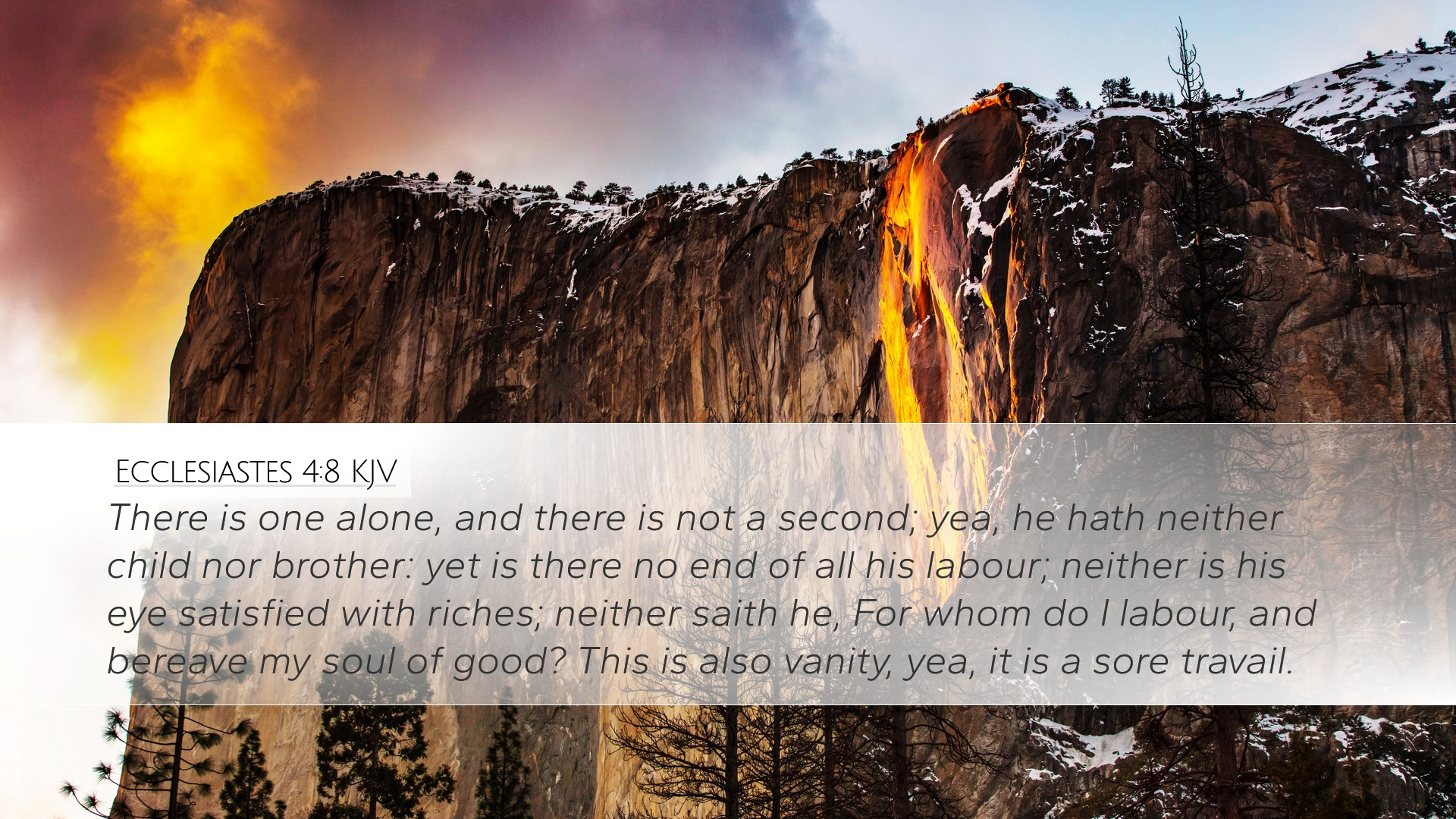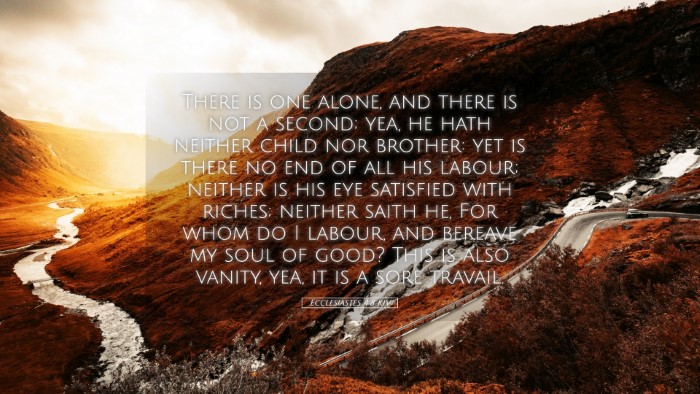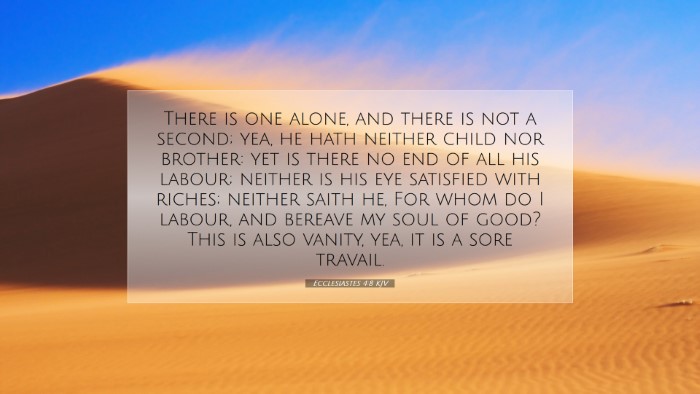Old Testament
Genesis Exodus Leviticus Numbers Deuteronomy Joshua Judges Ruth 1 Samuel 2 Samuel 1 Kings 2 Kings 1 Chronicles 2 Chronicles Ezra Nehemiah Esther Job Psalms Proverbs Ecclesiastes Song of Solomon Isaiah Jeremiah Lamentations Ezekiel Daniel Hosea Joel Amos Obadiah Jonah Micah Nahum Habakkuk Zephaniah Haggai Zechariah MalachiEcclesiastes 4:8
Ecclesiastes 4:8 KJV
There is one alone, and there is not a second; yea, he hath neither child nor brother: yet is there no end of all his labour; neither is his eye satisfied with riches; neither saith he, For whom do I labour, and bereave my soul of good? This is also vanity, yea, it is a sore travail.
Ecclesiastes 4:8 Bible Commentary
Ecclesiastes 4:8 - Commentary
Verse: "There is one alone, and there is not a second; yea, he hath neither child nor brother: yet is there no end of all his labour; neither is his eye satisfied with riches; neither saith he, For whom do I labour, and bereave my soul of good? This is also vanity, yea, it is a sore travail."
Introduction
The book of Ecclesiastes, attributed traditionally to King Solomon, provides profound reflections on the nature of life, the human condition, and the pursuit of meaning within the realm of existence. Ecclesiastes 4:8 speaks to the loneliness and futility experienced by individuals who pursue wealth and labor in isolation. This commentary synthesizes insights from Matthew Henry, Albert Barnes, and Adam Clarke, offering a comprehensive exploration of this poignant text.
Contextual Understanding
Ecclesiastes 4:8 must be understood within the broader narrative framework of Ecclesiastes, which often contrasts the fleeting nature of earthly pursuits with the eternal significance of relationships and divine purpose. The verse presents a solitary figure, reflecting the existential struggles that arise from a life dedicated solely to material gain.
Solitary Existence
Matthew Henry notes the gravity of the phrase "one alone," indicating a state of isolation that leads to despair. The absence of familial bonds—"neither child nor brother"—highlights the inherent loneliness that accompanies a life devoid of meaningful relationships. Henry stresses that this separation manifests in an endless cycle of labor that is ultimately unfulfilling.
The Pursuit of Wealth
Albert Barnes emphasizes the futility of striving for riches in isolation. The individual depicted in this verse continuously toils without end, underscoring a critical observation: wealth accumulates yet fails to satiate one’s desires. Barnes points out that such a pursuit compels one to question the purpose of labor when no one shares in the fruits of their efforts. This rhetorical reflection invokes a sense of existential inquiry into the purpose of gain.
The Unfulfilled Eye
Adam Clarke provides a deeper examination of the phrase "neither is his eye satisfied with riches." This metaphor encapsulates the insatiable nature of human desire. Clarke suggests that the pursuit of wealth not only leads to dissatisfaction but can also lead to the degradation of one’s soul, as one neglects the joys and responsibilities of companionship and community for the transient allure of material possessions.
The Vanity of Labor
The conclusion of the verse, where it states, "This is also vanity, yea, it is a sore travail," resonates deeply within the thematic framework of Ecclesiastes. All labor, when done without connection or purpose, ultimately results in vanity—a term used throughout the book to denote the fleeting and often perplexing nature of existence.
Labor Unfinished
Matthew Henry posits that labor, when motivated by selfish ambition alone, is rendered meaningless. He asserts that such toil is a "sore travail" because it yields no lasting enjoyment or relationship. The notion that human labor can be relentless yet pointless serves to illuminate the necessity of purpose and companionship in the human experience.
Reflections on Human Relationships
Barnes interjects a critical insight regarding the human condition: the value of relationships transcends material gain. He posits that the essence of life is not found in what one accumulates but in the community and love shared among individuals. The existential crisis depicted in this verse invites readers to ponder their own pursuits and the ultimate purpose behind their labor.
Conclusion
Ecclesiastes 4:8 serves as a profound reminder of the interconnectedness of human existence. As theologians and scholars engage with this text, the call to consider the purpose of labor amidst the inevitability of loneliness and longing for companionship resonates powerfully. The reflections from Henry, Barnes, and Clarke encapsulate a collective wisdom that urges us to reevaluate our pursuits and consider the weight of our choices in the light of enduring significance and relational fulfillment.
Application for Today
In a contemporary context, this verse invites individuals, particularly pastors and theologians, to explore how modern society often mirrors the isolation described in Ecclesiastes. As the world becomes increasingly individualistic, there lies a challenge to foster community and meaningful relationships, connecting both spiritually and socially.
This commentary, while deeply rooted in the wisdom of ecclesiastical thought, resonates across ages, emphasizing that fulfillment occurs not in solitary riches but in shared joys and communal labor for the common good.


